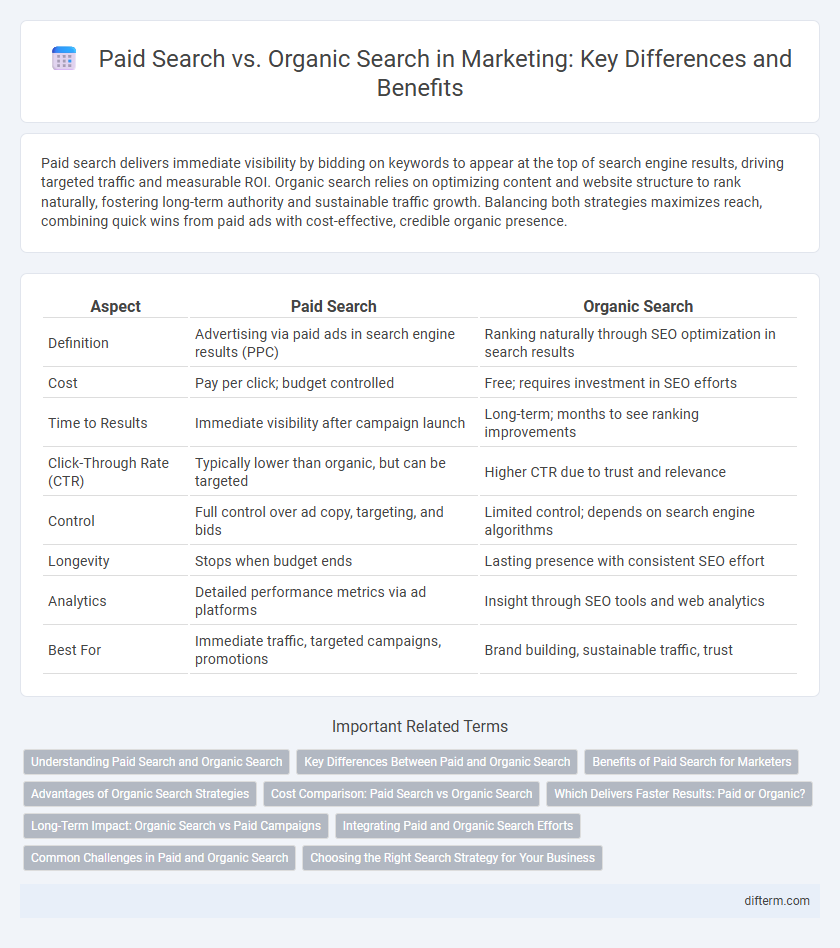Paid search delivers immediate visibility by bidding on keywords to appear at the top of search engine results, driving targeted traffic and measurable ROI. Organic search relies on optimizing content and website structure to rank naturally, fostering long-term authority and sustainable traffic growth. Balancing both strategies maximizes reach, combining quick wins from paid ads with cost-effective, credible organic presence.
Table of Comparison
| Aspect | Paid Search | Organic Search |
|---|---|---|
| Definition | Advertising via paid ads in search engine results (PPC) | Ranking naturally through SEO optimization in search results |
| Cost | Pay per click; budget controlled | Free; requires investment in SEO efforts |
| Time to Results | Immediate visibility after campaign launch | Long-term; months to see ranking improvements |
| Click-Through Rate (CTR) | Typically lower than organic, but can be targeted | Higher CTR due to trust and relevance |
| Control | Full control over ad copy, targeting, and bids | Limited control; depends on search engine algorithms |
| Longevity | Stops when budget ends | Lasting presence with consistent SEO effort |
| Analytics | Detailed performance metrics via ad platforms | Insight through SEO tools and web analytics |
| Best For | Immediate traffic, targeted campaigns, promotions | Brand building, sustainable traffic, trust |
Understanding Paid Search and Organic Search
Paid search involves bidding on keywords to display ads prominently on search engine results pages, driving immediate traffic and measurable ROI through targeted campaigns. Organic search relies on optimizing website content for relevant keywords, improving visibility naturally over time via search engine algorithms and user engagement. Prioritizing a balanced strategy enhances brand authority while maximizing short-term and long-term lead generation.
Key Differences Between Paid and Organic Search
Paid search delivers immediate visibility through targeted ads appearing at the top of search engine results pages (SERPs), driven by bidding on keywords for optimal placement. Organic search relies on SEO strategies to improve website content and authority, earning non-paid rankings in SERPs over time. Paid search offers precise control over budget and targeting, whereas organic search provides sustainable, long-term traffic growth without direct payment per click.
Benefits of Paid Search for Marketers
Paid search offers marketers immediate visibility on search engine results pages, driving targeted traffic that converts faster compared to organic search. It provides precise audience targeting through demographics, location, device, and user behavior, maximizing ad spend efficiency. Detailed performance metrics and real-time adjustments enable marketers to optimize campaigns continuously, ensuring higher ROI and better budget control.
Advantages of Organic Search Strategies
Organic search strategies offer sustainable long-term traffic growth by improving website authority and relevance through quality content and SEO best practices. They result in higher click-through rates as users tend to trust unpaid, natural search results more than paid ads. Investment in organic SEO builds lasting brand credibility and reduces dependency on advertising budgets compared to paid search campaigns.
Cost Comparison: Paid Search vs Organic Search
Paid search campaigns require continuous budget allocation, with costs varying based on keyword competitiveness and bidding strategies, often resulting in higher short-term expenses. Organic search focuses on long-term investment in SEO, which involves upfront costs for content creation and optimization but yields cost-effective traffic over time without direct payment per click. Businesses seeking immediate visibility may prefer paid search despite higher costs, while those prioritizing sustainable growth benefit from the cost-efficiency of organic search.
Which Delivers Faster Results: Paid or Organic?
Paid search delivers faster results by immediately placing ads at the top of search engine results pages, driving instant traffic and conversions. Organic search requires ongoing SEO efforts, with rankings typically improving over months, resulting in slower but sustained traffic growth. Marketers seeking quick visibility should invest in paid search, while long-term strategies benefit most from optimizing for organic search.
Long-Term Impact: Organic Search vs Paid Campaigns
Organic search builds sustained visibility and credibility by consistently attracting targeted traffic over time, resulting in compounding ROI and improved domain authority. Paid campaigns deliver immediate, measurable results and precise audience targeting but require ongoing investment to maintain traffic levels. Long-term marketing strategies favor organic search for durable brand presence, while paid search excels in short-term promotions and rapid lead generation.
Integrating Paid and Organic Search Efforts
Integrating paid and organic search efforts enhances overall search visibility by leveraging the strengths of both strategies to drive targeted traffic and improve conversion rates. Paid search provides immediate visibility and valuable data insights, which can inform organic keyword optimization and content development. Coordinating budgeting, keyword targeting, and performance analysis across paid and organic channels maximizes ROI and creates a cohesive search marketing strategy.
Common Challenges in Paid and Organic Search
Paid search campaigns often face challenges such as high cost per click (CPC) and ad fatigue, which reduce overall ROI, while organic search struggles with algorithm changes and prolonged timeframes to achieve rankings. Both strategies require continuous optimization of keywords and landing pages to maintain visibility and drive quality traffic. Balancing budget allocation between paid ads and SEO efforts is essential to address competition and changing market dynamics effectively.
Choosing the Right Search Strategy for Your Business
Choosing the right search strategy for your business hinges on understanding the distinct advantages of paid search and organic search. Paid search offers immediate visibility and precise targeting through platforms like Google Ads, driving quick traffic and measurable ROI. Organic search, developed through SEO best practices, builds long-term authority and sustained traffic by improving site relevance and user experience.
paid search vs organic search Infographic

 difterm.com
difterm.com